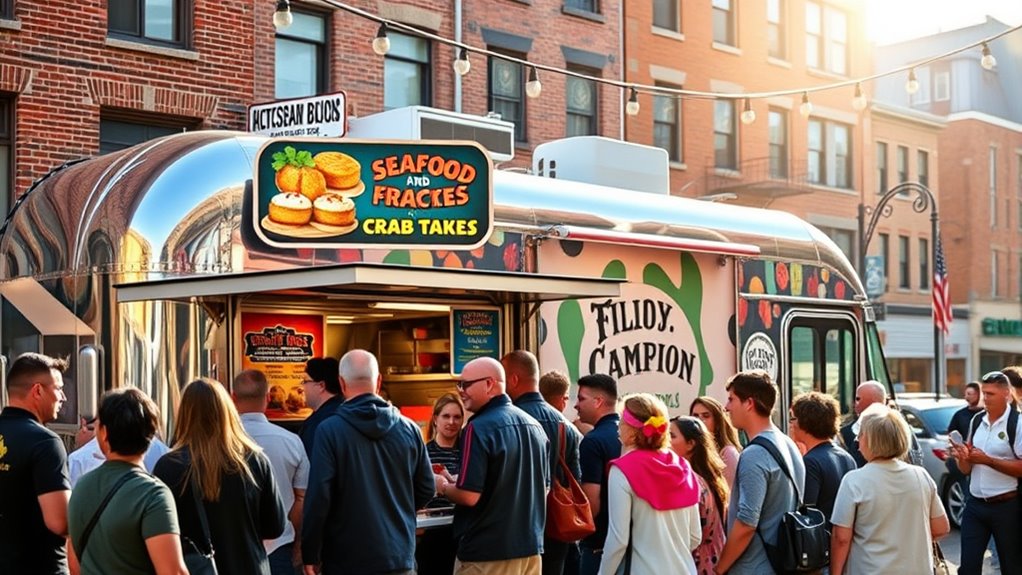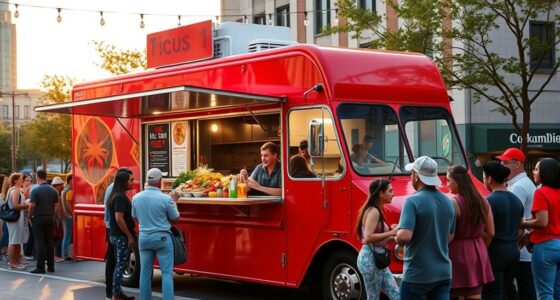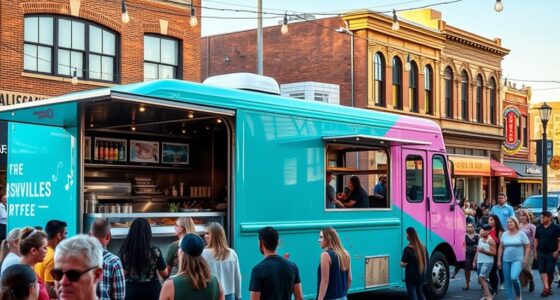To start a food truck in Baltimore, MD, you’ll need to follow local regulations, obtain permits through the city’s official portal, and guarantee compliance with health and safety standards. Plan your budget carefully, exploring financing options and insurance. Design a unique menu with local ingredients, set competitive prices, and develop a strong brand. Focus on community engagement and strategic event participation to build recognition. Discover more tips to launch successfully by exploring the next steps.
Key Takeaways
- Complete online permit applications and schedule inspections through Baltimore’s official permits portal.
- Choose compliant shared kitchens and acquire necessary health certifications for food preparation.
- Secure reliable, insured vehicles and consider financing options like leasing or loans for startup costs.
- Design a menu highlighting local ingredients, balancing quality and profitability, and implement mobile payment systems.
- Develop a strong brand, engage with the community, and utilize social media to promote your food truck launch.
Baltimore’s Vibrant Food Scene
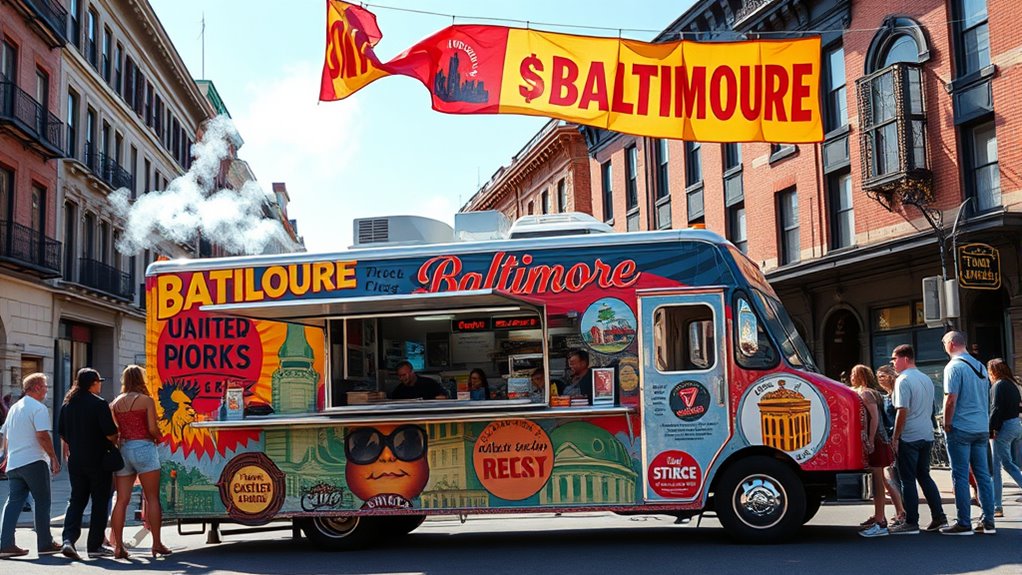
Baltimore’s food scene is a dynamic blend of tradition and innovation that draws both locals and visitors alike. As a food truck owner, you can stand out by focusing on food truck branding that captures the city’s unique spirit. Developing a strong visual identity helps attract customers and builds recognition. Additionally, social media marketing plays a vital role in spreading the word about your truck’s location, special menu items, and events. Constant engagement on platforms like Instagram and Facebook keeps your audience interested and encourages repeat visits. Baltimore’s diverse culinary culture offers endless opportunities to experiment and grow your brand. By combining eye-catching branding with effective social media strategies, you’ll position your food truck for success in this vibrant, competitive market. Incorporating creative branding ideas, such as themed decor and unique signage, can further enhance your presence and attract more customers.
Understanding Local Requirements
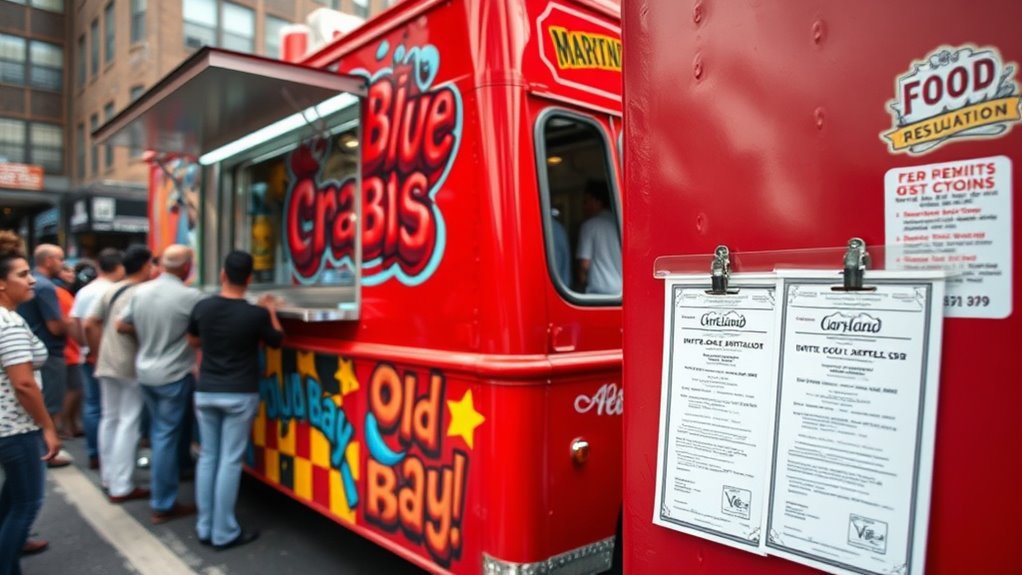
To get started, you’ll need to complete the online permit application process through Baltimore’s local government website. It’s important to schedule your inspection appointment early to avoid delays and guarantee everything meets the requirements. Also, familiarize yourself with designated street parking zones to avoid parking violations and secure a spot for your food truck. Be sure to check the retail hours today list for any updates on local business hours that might affect your planning.
Online Permit Application Process
Guiding the online permit application process in Baltimore requires careful attention to the city’s specific requirements. You’ll start by visiting the Baltimore government’s official permits portal, where you can access the online application system. The permit process involves completing detailed forms that include your business information, food truck details, and safety plans. Make sure to gather all necessary documents beforehand, such as proof of insurance and health certifications. The online application allows you to submit everything electronically, saving you time and reducing errors. After submission, you’ll receive confirmation and instructions for any additional steps. Staying organized and adhering to Baltimore’s specific online application procedures guarantees a smoother process, helping you move quickly toward launching your food truck.
Schedule Inspection Appointment Early
Once you’ve submitted your online permit application, it’s important to schedule your inspection appointment promptly. An early appointment guarantees you stay on track and avoid delays. Baltimore’s health department can have busy schedules, so securing your inspection scheduling early helps you lock in a convenient time. Visualize walking into a bustling health office, paperwork in hand, ready for review. Picture the inspector checking your food prep area, ensuring everything meets local standards. You might see a clipboard with checklists, a bustling staff member answering questions, and a calendar marked with your appointment date. By booking early, you avoid last-minute stress and ensure your food truck is ready to roll. Remember, an early appointment keeps your process smooth and your launch on schedule.
Designated Street Parking Zones
Understanding the designated street parking zones in Baltimore is essential for legally operating your food truck. You must familiarize yourself with local parking regulations to avoid fines or towing. Check street signage carefully, as it indicates where parking is permitted and any restrictions, such as time limits or permit requirements. Baltimore enforces specific zones where food trucks can park, often in designated areas or with special permits. Ignoring these regulations can disrupt your business and lead to penalties. Always verify signage before parking to ensure compliance with local rules. Staying informed about street signage and parking regulations helps you avoid violations and ensures smooth daily operations. By respecting these zones, you’ll keep your business running legally and efficiently in Baltimore.
Setting Up Your Base of Operations
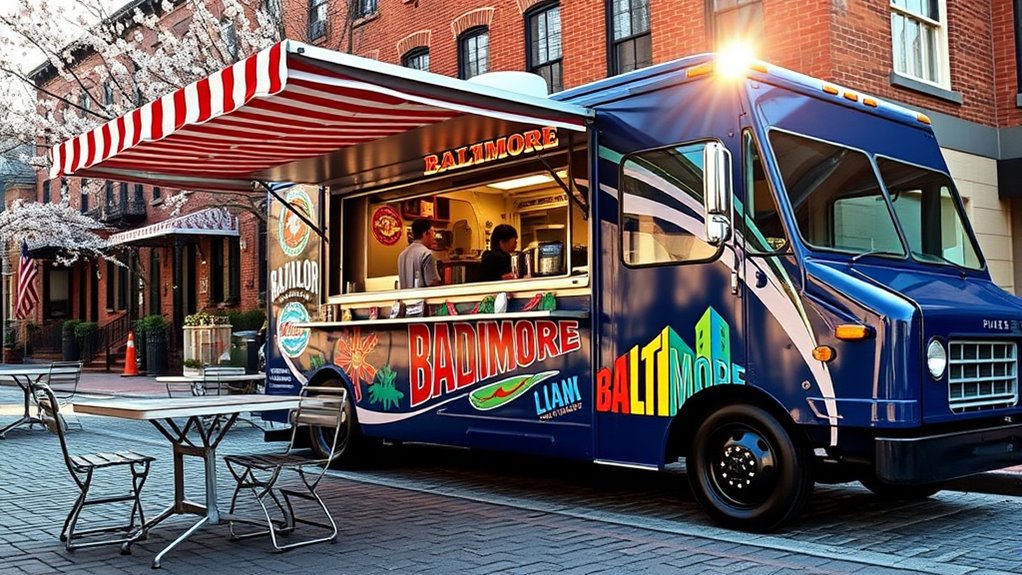
Choosing the right shared kitchen licensing options can save you time and money while guaranteeing Baltimore’s regulations. Selecting custom kitchen equipment ensures your truck is tailored to your menu and operations. Let’s explore how to set up a practical and compliant base of operations for your food truck. Incorporating appetizer options, such as crab cakes or shrimp ceviche, into your menu can attract a diverse customer base and showcase your culinary creativity.
Shared Kitchen Licensing Options
Setting up your food truck’s base of operations often involves selecting a shared kitchen, which can be a cost-effective and flexible licensing option. Shared kitchen licensing allows you to operate in a licensed co-working space that meets health and safety standards. These spaces typically feature commercial-grade appliances, designated prep areas, and sanitation stations. They simplify compliance with co working space regulations, reducing the hassle of obtaining a separate commercial kitchen license. Imagine working in a bustling, well-equipped environment where you can focus on perfecting your recipes. You gain access to:
- Commercial refrigerators and freezers
- Multiple prep stations
- Ventilation and fire safety systems
- Clean, compliant sanitation facilities
This setup streamlines licensing, saves costs, and gets you on the road faster.
Custom Kitchen Equipment Selection
After securing a shared kitchen, selecting the right custom equipment becomes essential to efficiently run your food truck. You need reliable custom kitchen appliances tailored to your menu, ensuring quick service and quality. Focus on durable, easy-to-clean equipment that minimizes downtime and simplifies equipment maintenance. Carefully choose items like grills, fryers, and refrigeration units suited for mobile use. Regular maintenance keeps your appliances running smoothly, preventing costly repairs. Here’s a quick overview:
| Equipment Type | Key Features | Maintenance Tips |
|---|---|---|
| Commercial Grill | Even heat, compact design | Regular cleaning, inspection |
| Deep Fryer | Temperature control | Drain and clean weekly |
| Refrigeration Units | Energy-efficient, compact | Check seals, defrost regularly |
| Food Prep Tables | Durable, easy to sanitize | Clean after each use |
| Storage Cabinets | Secure, rust-resistant | Keep organized, clean periodically |
Budgeting and Financing Your Food Truck
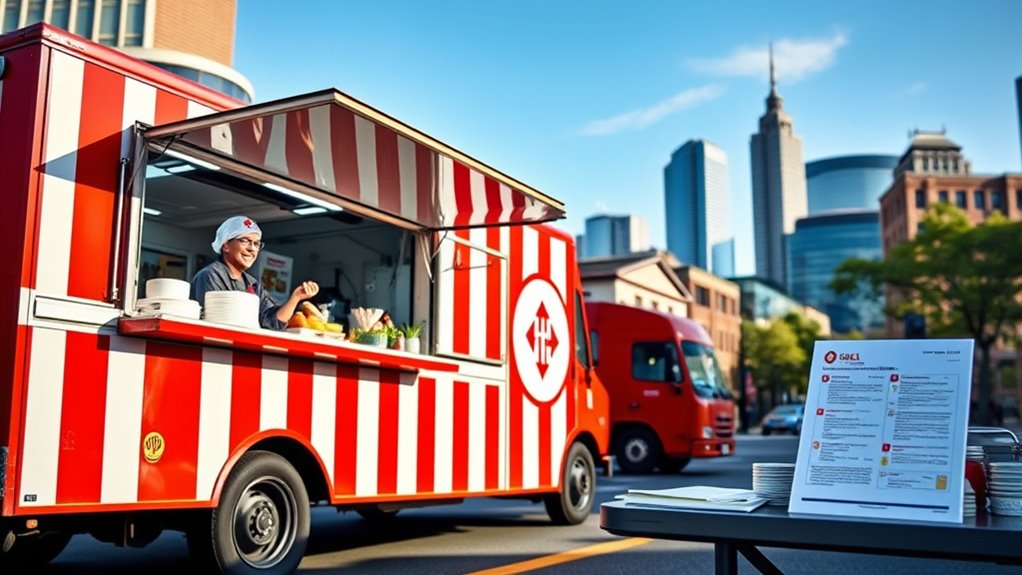
Getting your food truck off the ground requires understanding your initial costs, like the vehicle purchase and insurance. You can explore loan programs designed for commercial kitchens to help with financing, and securing liability coverage is essential to protect your business. Additionally, embracing failure as a learning opportunity can help you adapt and improve your business strategies throughout the process. By carefully budgeting for these expenses, you’ll set a strong foundation for your food truck venture in Baltimore.
Initial Vehicle Purchase Costs
Purchasing your food truck is a significant investment that requires careful budgeting and financing. The initial vehicle costs can vary based on size, customization, and condition. When exploring options, consider vehicle financing to spread out payments and make the purchase more manageable. Don’t forget to factor in insurance costs, which protect your business and can add to ongoing expenses. Picture yourself:
- A sleek, custom-painted truck ready for the streets
- A compact kitchen with stainless-steel counters and appliances
- Bright signage that grabs attention from passersby
- A secure, well-maintained engine powering your daily routes
These visuals help you understand what your investment covers. Budget wisely to ensure your vehicle is reliable, insured, and set for success in Baltimore’s bustling food scene.
Commercial Kitchen Loan Programs
Securing a commercial kitchen loan can be a smart way to finance your food truck without draining your savings. Many lenders offer specialized programs for kitchen leasing and equipment financing, making it easier to access the tools you need. With kitchen leasing, you can rent a fully equipped commercial space, saving upfront costs while ensuring compliance with health standards. Equipment financing allows you to spread out the cost of essential appliances and cooking gear, freeing up cash flow. These loan programs often have flexible terms tailored for small businesses, helping you manage your budget effectively. By exploring your options, you can find affordable financing solutions that keep your startup costs manageable, enabling you to focus on launching your Baltimore food truck successfully.
Liability Coverage for Food Trucks
When planning your food truck budget in Baltimore, accounting for liability coverage is a vital step. Insurance requirements for food trucks include liability coverage to protect you from potential claims. This coverage helps cover damages or injuries caused during operations, giving you peace of mind. Imagine:
- A customer slipping on a wet floor outside your truck
- Damage caused by your vehicle during parking
- An ingredient allergy reaction from food served
- Property damage to nearby structures
These scenarios highlight the importance of liability coverage. It’s essential to understand local insurance requirements and ensure your policy provides adequate liability protection. Budgeting for this coverage upfront prevents unexpected expenses and keeps your food truck business secure and compliant with Baltimore’s regulations.
Designing Your Menu and Pricing Strategy
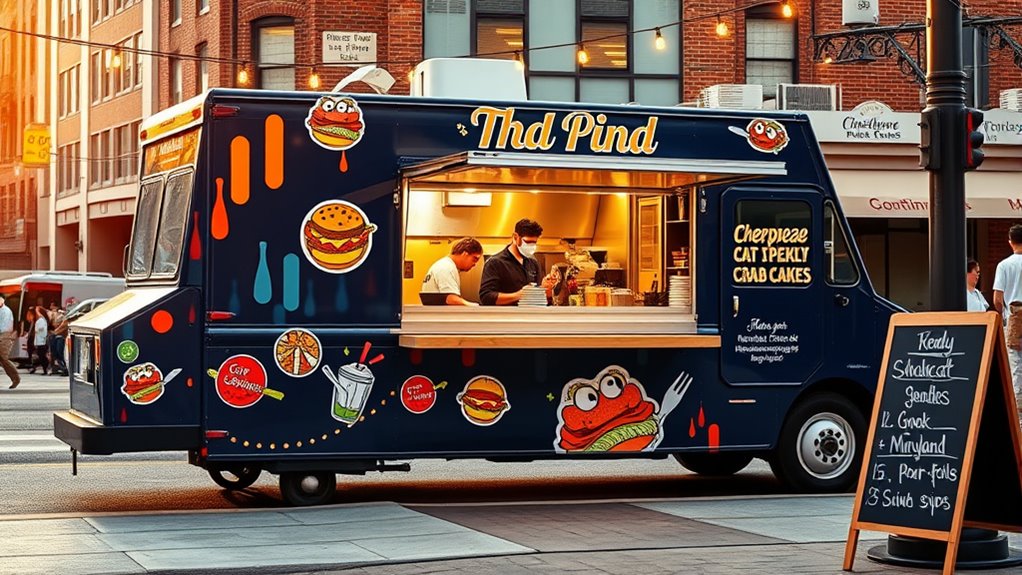
To create a menu that attracts customers and stays profitable, you need to consider locally sourced ingredients that highlight Baltimore’s flavors. Break down the costs of each item precisely to ensure your pricing covers expenses and gives you a fair profit. Balancing quality, affordability, and local appeal will set your food truck apart.
Locally Sourced Ingredient Integration
Incorporating locally sourced ingredients into your menu not only enhances the freshness and flavor of your dishes but also appeals to customers who value sustainability and community support. To succeed, establish strong sourcing partnerships with nearby farms and vendors focused on ingredient freshness. This guarantees you receive quality produce regularly, boosting your menu’s appeal. Consider highlighting these local connections on your menu to attract eco-conscious diners. Visualize vibrant, farm-fresh vegetables, freshly caught seafood, and farm-raised meats that elevate your dishes. You’ll build a reputation for authenticity and support local businesses. By integrating these ingredients thoughtfully into your menu, you create a unique culinary experience while strengthening community ties. This approach not only improves flavors but also aligns your brand with Baltimore’s local spirit.
Precise Menu Item Cost Breakdown
Creating a successful food truck menu requires carefully analyzing the costs behind each item to guarantee profitability. A precise menu item cost breakdown helps you understand exactly how much each dish costs to produce, ensuring accurate pricing. Start with an ingredient pricing analysis, evaluating the cost of every component, from proteins to spices. Include overhead expenses like packaging and labor in your calculations. By breaking down these costs, you can identify high-margin items and adjust prices accordingly. This detailed approach prevents underpricing or overpricing, maximizing profits and maintaining competitive prices. Regularly reviewing your menu item cost breakdown allows you to adapt to changing ingredient prices and market trends, keeping your food truck financially healthy and sustainable in Baltimore’s bustling food scene.
Technology and Operations
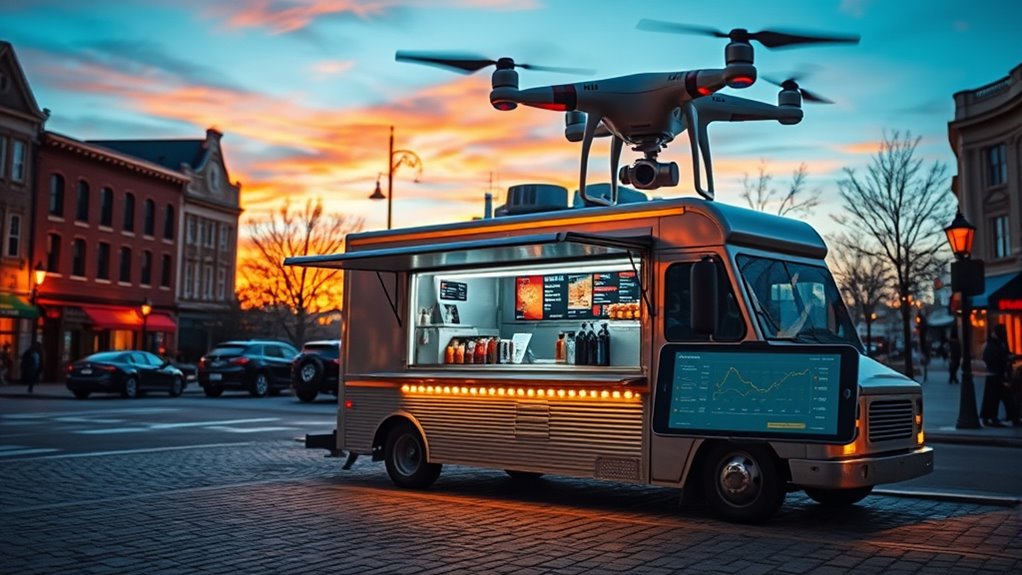
Using mobile payment apps that are compatible with your system makes transactions faster and more convenient for customers. Real-time stock tracking software helps you stay on top of inventory levels, reducing waste and shortages. Both tools streamline your operations, so you can focus on serving great food and growing your business. Incorporating mindfulness techniques into your daily management can also improve decision-making and reduce stress during busy hours.
Mobile Payment Apps Compatibility
Ensuring your food truck is compatible with popular mobile payment apps is essential for smooth transactions and satisfied customers. With mobile payment compatibility, you can accept contactless payments, reducing wait times and increasing efficiency. This technology allows customers to pay quickly using their smartphones, creating a seamless experience. To optimize this, consider features like:
- Tap-to-pay options with QR codes
- Compatibility with major apps like Apple Pay, Google Pay, and Samsung Pay
- Secure payment processing to protect customer data
- Easy integration with your POS system
Real-Time Stock Tracking Software
Implementing real-time stock tracking software is essential for maintaining accurate inventory levels and streamlining operations. With effective inventory management, you can monitor stock levels instantly, reducing waste and preventing shortages. This technology helps you track every ingredient and supply as you use them, guaranteeing you stay on top of inventory needs without manual counting. Additionally, integrated order tracking features allow you to see incoming supplies and manage deliveries seamlessly. This real-time insight enables you to make quick adjustments, optimize stock replenishment, and avoid costly delays. By adopting this software, you improve overall efficiency, reduce errors, and ensure your food truck runs smoothly. In the competitive Baltimore food scene, staying organized with reliable stock tracking gives you a decisive edge.
Marketing and Growing Your Presence
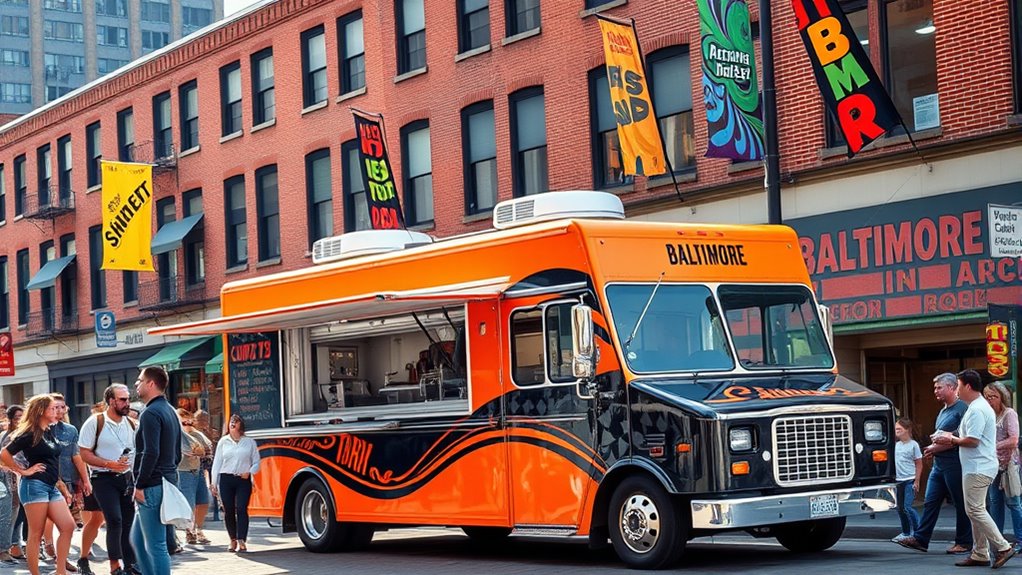
To build your presence in Baltimore, you should focus on scheduling your appearances at popular events that draw crowds. Engaging with the local foodie community through festivals and special events can boost your visibility and attract loyal customers. By consistently participating in these activities, you’ll strengthen your brand and grow your fan base over time.
Popular Event Scheduling Tips
Wondering how to maximize your food truck’s visibility at local events? Proper event scheduling is key. Plan around local festivals, farmers markets, and community gatherings when foot traffic is high. Use seasonal menu planning to keep offerings fresh and exciting, encouraging repeat visits. Promote these appearances through social media marketing, creating buzz beforehand and sharing live updates during events. Consider the timing of your appearances—weekends or evenings often draw larger crowds. Partner with local organizers to secure prime spots and ensure your truck stands out. Consistent scheduling helps build recognition and loyal customers. By strategically choosing events and leveraging social media, you’ll boost visibility and grow your presence in Baltimore’s vibrant food scene.
Engaging Foodie Community Events
Engaging with Baltimore’s passionate foodie community can substantially boost your food truck’s visibility and reputation. Participating in foodie festivals and community cook-offs allows you to showcase your unique flavors and connect directly with local customers. These events create opportunities for word-of-mouth marketing and social media buzz, helping your truck stand out. To maximize your impact, consider the following activities:
| Event Type | Benefits | Tips |
|---|---|---|
| Foodie Festivals | Wide exposure, brand awareness | Share samples, engage online |
| Community Cook-offs | Build local loyalty, credibility | Offer signature dishes |
| Foodie Meetups | Network with enthusiasts | Collaborate with vendors |
| Farmers Markets | Fresh, local ingredient focus | Highlight quality ingredients |
| Charity Events | Goodwill, community support | Promote your involvement |
Optimizing Your Baltimore Launch
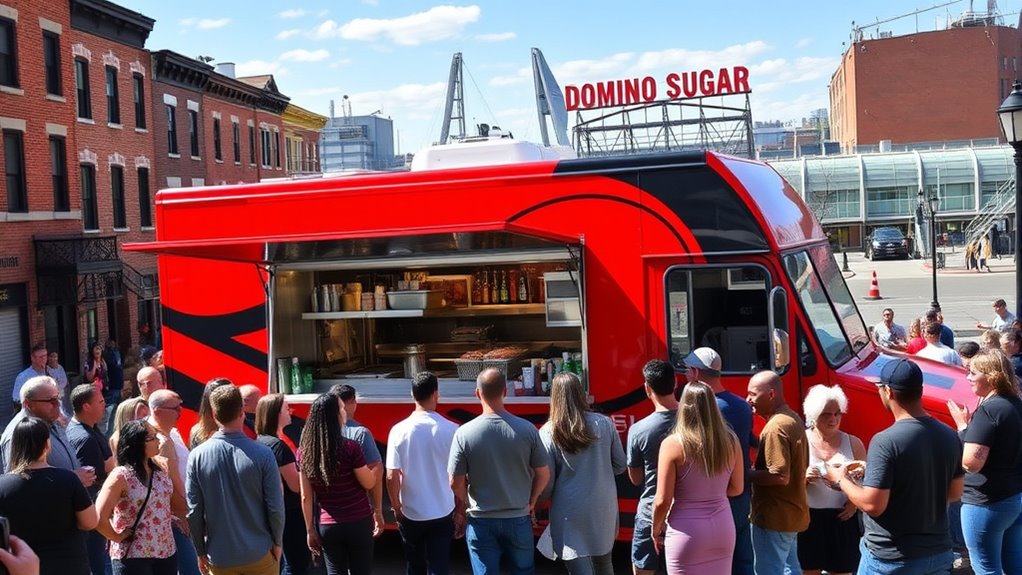
Launching your food truck in Baltimore requires strategic planning and attention to local nuances. To optimize your launch, focus on strengthening your food truck branding to make a memorable impression. Use social media marketing to build buzz before you hit the streets, showcasing your menu and unique story. Consider these key strategies:
Launch your Baltimore food truck with strong branding and social media buzz to stand out locally.
- Engaging visuals of your signature dishes to attract local food lovers
- Partnering with Baltimore-based influencers to expand your reach
- Posting countdowns and sneak peeks to generate excitement
- Highlighting your presence at popular local events and neighborhoods
Frequently Asked Questions
What Permits Are Required for Operating a Food Truck During Festivals?
You need vendor permits to operate your food truck at festivals in Baltimore. Additionally, check parking regulations for the event area, as they can affect where you can park your truck. Make sure to acquire any special festival permits required by organizers and the city. Complying with parking rules and securing the correct permits ensures you can serve customers smoothly and avoid fines or being asked to leave.
How Can I Find the Best Locations for My Food Truck?
You should analyze parking options and foot traffic to find the best food truck locations. Investigate popular areas like downtown, event venues, and busy neighborhoods, and observe where people gather during peak hours. Talk to local business owners or event organizers to identify high-traffic spots. Regularly test different locations to see what attracts the most customers, and stay flexible to adapt based on your findings.
What Are Common Challenges Faced by New Baltimore Food Truck Owners?
As a new Baltimore food truck owner, you’ll face challenges like managing financial planning to keep your business afloat and ensuring equipment maintenance to avoid costly breakdowns. You might struggle with finding steady spots and maneuvering local regulations, but staying organized and proactive helps. Focus on budgeting carefully and scheduling regular maintenance. These steps will help you overcome common hurdles and grow your food truck business successfully in Baltimore.
How Do I Handle Health Inspections and Food Safety Regulations?
Think of health inspections as your food truck’s backstage pass to success. You handle them by staying ahead with regular food safety training, ensuring your staff knows proper hygiene and handling procedures. Prepare thoroughly for the health inspection process, keeping your truck spotless and documentation up-to-date. By consistently maintaining these standards, you’ll breeze through inspections and build customer trust, turning your food truck into a Baltimore favorite.
What Insurance Coverage Is Recommended for Food Truck Businesses?
You should get complete food truck insurance to protect your business. Look for coverage options like general liability, vehicle insurance, and property protection. Food truck insurance shields you from accidents, injuries, and property damage. It’s also wise to take into account coverage for your equipment and potential food-related claims. By choosing the right coverage options, you guarantee your food truck stays protected against unexpected costs and liabilities on the road.
Conclusion
Starting your food truck in Baltimore is like planting a seed in a city rich with flavor and history. With care, passion, and perseverance, your venture can grow into a vibrant beacon that feeds both body and soul. Embrace each challenge as nurturing water, every success as sunlight, and watch your dream blossom amidst Baltimore’s lively streets. Your journey begins now—cultivate it with heart, and let your food truck become a beloved part of the city’s tapestry.
